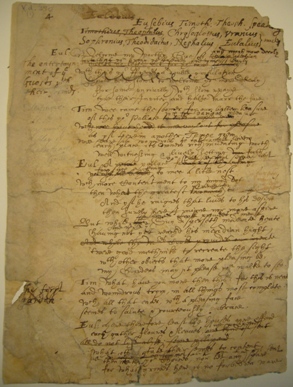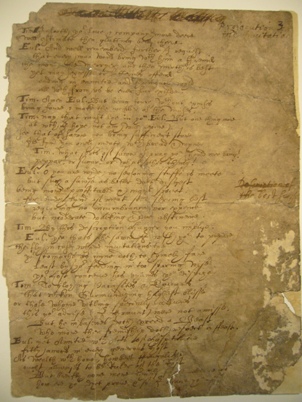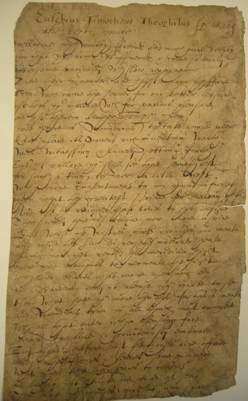Eusebius, Timotheus, Theophilus (Folger MS X.d.390)
Historical Records
Folger Shakespeare Library MS fragment
(Reproduced by permission of the Folger Shakespeare Library)
Two small quarto leaves (three pages of writing) of this lost play exist as Folger MS. X.d.390 (1-2):

|

|

|
| Folger X.d.390, fol.1a (Click here for transcription) (Click here for the relevant portion of Erasmus) |
Folger X.d.390, fol.1b (Click here for transcription) (Click here for the relevant portion of Erasmus) |
Folger X.d.390, fol.2a (Click here for transcription) (Click here for the relevant portion of Erasmus) |
Fols.1a & 1b are from the play in a state of composition, with heavy deletions and irregularities. Fol.2a is a fair copy of part of the same content.
Theatrical Provenance
Unknown. Proudfoot suspects it might be a university play:
All three pages appear to be in the hands of a single writer using Italian forms for stage directions and speech prefixes and English with some Italian forms for the speeches. The hands resemble some found in Oxford and Cambridge manuscripts of the early seventeenth century and are undoubtedly those of an author in process of composition. The stanzaic verse of lines 43-80 suggests an occasional entertainment, either in a college or a private house, rather than a play.(59)
Probable Genre(s)
University play? (Proudfoot). Christian subject matter?
Possible Narrative and Dramatic Sources or Analogues
It is not clear whether this fragment dramatised historical personages or simply used historical names. There are a number of possible inspirations for the names.
Eusebius of Caesarea (b. ca.260AD, d. ca.341AD) was one of the church fathers: a bishop, historian and biblical scholar in general. There was also a Bishop of Caesarea named Theophilus (d.195AD?).
Alternatively, "Timothy" may refer to Pope Timothy I of Alexandria (381-385AD), "Theophilus" may refer to Pope Theophilus of Alexandria (385-412AD), who succeeded Timothy and turned against the monks of Nitria, amongst whom one was named Eusebius. (See, for example, the chronological list of Patriarches of Alexandria on the website of the Greek Orthodox Patriarchate of Alexandria and All Africa).
References to the Play
(Information welcome)
Critical Commentary
The two leaves of this fragment once constituted part of a collection of miscellaneous manuscripts formed by Frederick Hendricks c.1891 (Halliwell-Phillipps and Roach Smith on Shakespeare [manuscript, 1891]. Hendriks had noted of the fragment that "[t]he handwriting closely resembles that of Philip Massinger" (qtd. in Proudfoot 59), an attribution cautiously repeated by modern pencil notes on the MS itself: "M.S. fragment of a ply of Shakespeare's time. ? Massinger" (qtd. in Proudfoot 59). There appears to be no basis for this attribution, Proudfoot noting simply "The hand bears nor resemblance to that of Massinger" (59).
For What It's Worth
(information welcome)
Works Cited
Site created and maintained by David McInnis, University of Melbourne; updated 13 Feb 2011.